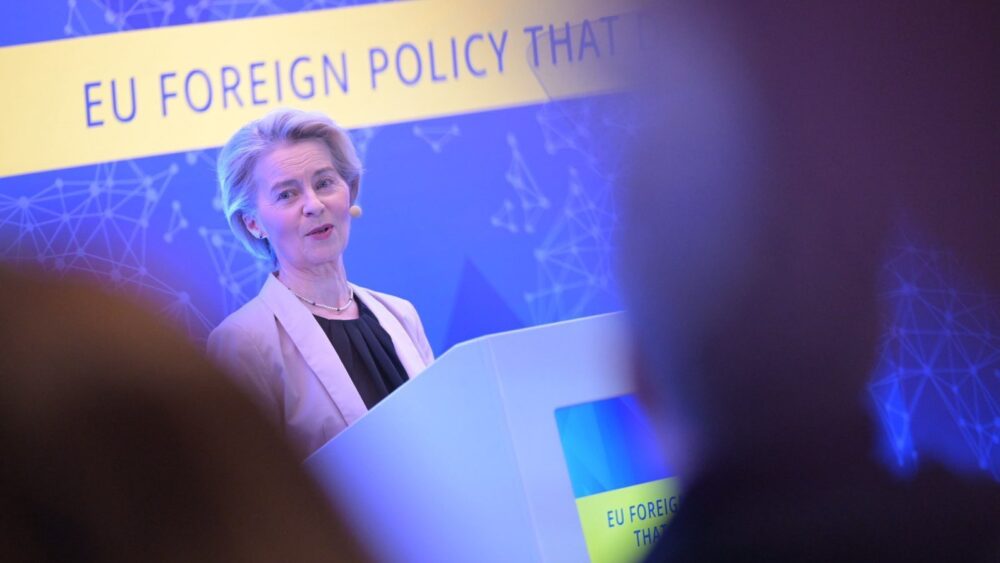
EU Commission President Ursula von der Leyen
Photo: @vonderleyen on X, 4 February 2025
EU member state representatives, diplomats, and MEPs are increasingly worried about Commission President Ursula von der Leyen’s tightening grip on the bloc’s foreign policy. They once again voiced their disapproval after von der Leyen presented her global geopolitical vision to EU ambassadors on Tuesday, February 4th.
Speaking at this year’s EU Ambassadors Conference in front of 145 diplomats representing Brussels worldwide, von der Leyen began by praising herself for “transforming Europe into a geopolitical Union” in the past five years, with an ever-growing presence in global affairs. But the work is not done, she continued, arguing that in the new “era of hyper-competitive and hyper-transactional geopolitics,” the EU needs to speed up this process and change “the way we act,” by being “bold,” “agile,” and not afraid of engagement to “project our power.”
She then went on to cover the EU’s “intricate” relationships with China and the U.S.; talked about the importance of strengthening trade relations with Mercosur, Mexico, and Malaysia, as well as delivering further development aid in the Mediterranean region. She also announced plans to organize an international summit in South Africa as well as further “landmark events” partnered with the African Union and Central Asian countries. Additionally, she said she will lead a delegation of Commissioners to India for the first time later this month. Von der Leyen even announced the establishment of a “special tribunal” to hold Putin and other Russian war criminals accountable, although it is unclear how that would work in practice.
As attendees noted, however, this grand speech felt like it was meant to overshadow both Kaja Kallas—the EU’s High Representative for Foreign Affairs and head of its diplomatic corp, the EEAS, who was originally supposed to host the conference—and European Council President António Costa, whose role is to serve as a bridge between the Commission and member states, which, according to the treaties, should be in control of the EU’s foreign policy decisions.
This follows a long trend of von der Leyen taking control over decisions traditionally made by the Council of member states while simultaneously weakening the representative role of the EEAS, and gradually shifting their competencies under her own command. As the relationship between von der Leyen and the former heads of the EUCO and EEAS, Charles Michel and Josep Borrell were somewhat antagonistic at times because of this encroachment on their power, her strategy toward Costa and Kallas now seems to treat them from the start as accessories, rather than partners.
On the one hand, von der Leyen issued massive budget cuts to the EEAS while simultaneously creating a new Commission directorate for the Middle East and North Africa (MENA) region and the Gulf, widely seen as another power grab that undercuts Kallas and further centralizes the EU’s foreign policy. On the other hand, she is increasingly making decisions in the name of the Council and presenting them as fact later—like in the case of the Mercosur trade deal and the special duties imposed on Chinese EV imports—which sidelines member states and erodes their sovereignty.
Just last week, von der Leyen announced a €3 billion development partnership with Jordan—without even consulting member state representatives. “We were confronted with a fait accompli while we’re the ones footing the bill,” an unnamed diplomat told Politico after the revelation. “It’s not the first time von der Leyen pulls a stunt like this because she wants to make nice with world leaders. [EU member states] are increasingly fed up with it,” he added.
Even leftist MEPs from the so-called ‘Ursula coalition’ are becoming uneasy with these frequent power grabs. “Foreign policy is bending towards the Commission, and this is not the treaties’ framework,” Spanish socialist MEP Nacho Sánchez Amor commented recently, harshly criticizing von der Leyen for “grabbing the [smallest] crumb of foreign power on every occasion.”
“Is not foreign policy the competence of the Council?” he asked. “This has to be clarified because it’s very confusing for our interlocutors in the world.”
The truth is that such clarifications are long overdue. If member states don’t take action soon and put an end to Queen Ursula’s rampage, which is transforming how the EU works at its core, there will not be anyone left with a loud enough voice to challenge her.
